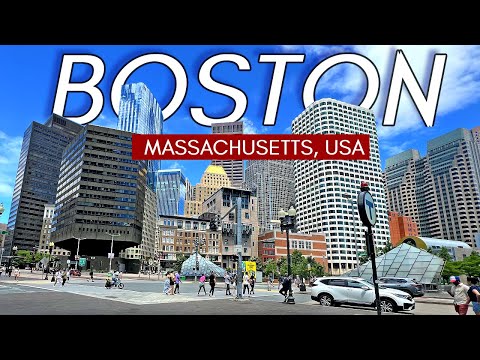Walking in BOSTON MASSACHUSETTS - The Most European City in the US (with captions)

Hello and welcome to another walking tour from your favorite channel, Fragile Rovers Today, we are walking on the streets of downtown Boston, Massachusetts USA. While exploring the city, we are also going to be learning a few things such as history, economy, education etc about this city So, sit back and relax while I show you around BOSTON MASSACHUSETTS! History: Boston, founded in 1630 by Puritan settlers from England, swiftly became a pivotal city in American history. It played a crucial role in the American Revolution, hosting events like the Boston Massacre and the Boston Tea Party, which ignited sentiments against British rule. The Battle of Bunker Hill and the Siege of Boston further solidified its significance in the fight for independence.
Boston's historical landmarks include the Massachusetts State House, where pivotal decisions were made during the revolution, and the Old North Church, famous for Paul Revere's midnight ride. Its rich history is palpable in its cobblestone streets, preserved neighborhoods like Beacon Hill, and numerous museums that chronicle its revolutionary past. Culture and Arts: Boston's cultural landscape is as diverse as it is rich. The city boasts world-class institutions such as the Museum of Fine Arts, renowned for its extensive collection spanning ancient to contemporary art. The Boston Symphony Orchestra, one of the world's premier orchestras, and the Boston Ballet showcase high-caliber performances. Literary history abounds with authors like Edgar Allan Poe and Nathaniel Hawthorne, who drew inspiration from the city's intellectual ambiance.
The Boston Athenaeum, a historic library and cultural center, has been a hub for writers and thinkers since 1807. The city's vibrant theater scene includes venues like the Boston Opera House and the Wang Theatre, hosting Broadway shows and other productions. Boston's commitment to arts education is evident through institutions like the Berklee College of Music, shaping generations of musicians and artists. Education: Boston is synonymous with academic excellence, home to prestigious universities that have shaped global education and research. Harvard University, founded in 1636, stands as the oldest institution of higher learning in the United States and has produced countless leaders in various fields.
Massachusetts Institute of Technology (MIT), renowned for its contributions to science and technology, fosters innovation through its research labs and entrepreneurial spirit. Boston University, Tufts University, and Northeastern University are also prominent institutions contributing to the city's intellectual vitality. The city's colleges and universities not only attract students from around the world but also drive innovation and economic growth through cutting-edge research in biotechnology, engineering, and healthcare. Architecture and Landmarks: Boston's architectural landscape is a testament to its rich history and evolving urban character.
The Massachusetts State House, designed by Charles Bulfinch and completed in 1798, is an iconic example of Federal-style architecture and houses the state government. The Old North Church in the North End, built in 1723, is famous for its role in Paul Revere's ride and remains a symbol of colonial resilience. Modern landmarks like the Prudential Tower and the John Hancock Tower dominate the skyline, reflecting Boston's embrace of contemporary design and urban planning. The city's neighborhoods feature a mix of historic brownstones in Beacon Hill, Victorian homes in Jamaica Plain, and modern developments in the Seaport District.
Architectural preservation efforts ensure that Boston's heritage is maintained while allowing for innovative new designs that meet the city's growing needs. Whether exploring its cobblestone streets or its soaring skyscrapers, Boston's architecture tells a story of resilience, innovation, and cultural richness. Neighborhoods: Boston's neighborhoods offer a diverse tapestry of cultures, histories, and lifestyles, each contributing to the city's identity. Back Bay is known for its Victorian brownstones and upscale shopping along Newbury Street, while Beacon Hill's gas-lit streets and historic homes evoke a bygone era of Bostonian aristocracy. The South End, with its vibrant arts scene and Victorian row houses, contrasts with the bustling commercialism of Downtown Crossing. The North End, Boston's oldest residential community, is famous for its Italian-American heritage and delicious cuisine, making it a popular destination for locals and tourists alike.
Each neighborhood has its own unique charm and character, from the waterfront views of the Seaport District to the academic atmosphere around Harvard Square in Cambridge. Boston's neighborhoods not only reflect its historical roots but also embody its dynamic growth and cultural diversity, making the city a mosaic of experiences waiting to be explored. Economy and Industry: Boston's economy is characterized by its diverse sectors and leadership in innovation and education.
The city's financial district, centered around State Street and Congress Street, is home to major banks, investment firms, and corporate headquarters. Boston's technology sector thrives with a concentration of startups, venture capital firms, and research institutions driving advancements in biotechnology, robotics, and software development. The presence of renowned universities like Harvard, MIT, and Boston University fosters a strong knowledge economy, attracting talent and investment from around the world.
Healthcare and biotechnology are significant industries, with institutions such as Massachusetts General Hospital and Biogen leading research and development initiatives. The Seaport District, once an industrial area, has transformed into a hub for innovation and entrepreneurship, with modern office spaces and amenities attracting tech companies and creative industries. Boston's economic resilience and innovation ecosystem continue to position the city as a global leader in education, healthcare, finance, and technology.
Sports: Boston is a city deeply rooted in sports culture, boasting a passionate fan base and storied athletic traditions. The city's professional teams, including the Boston Red Sox (baseball), Boston Celtics (basketball), Boston Bruins (hockey), and New England Patriots (football), have earned numerous championships and devoted followers. Fenway Park, home of the Red Sox, is the oldest ballpark in Major League Baseball and a beloved landmark where generations of fans have cheered on their team.
The TD Garden hosts both Celtics basketball games and Bruins hockey matches, drawing crowds for electrifying playoff runs and championship celebrations. Boston's sports history is intertwined with legendary players like Larry Bird, Bobby Orr, Tom Brady, and David Ortiz, who have left indelible marks on their respective sports. The city's sports culture extends beyond professional leagues, with collegiate athletics and recreational leagues playing integral roles in community life.
Whether celebrating a championship win or supporting local youth teams, sports are a unifying force in Boston's cultural fabric. Food and Cuisine: Boston's culinary scene is a blend of traditional New England flavors and diverse international influences, reflecting its rich history and multicultural population. Iconic dishes like clam chowder, lobster rolls, and Boston cream pie are beloved staples found in restaurants and eateries throughout the city. The North End, Boston's Little Italy, is famous for its authentic Italian cuisine, from handmade pasta and cannoli to hearty meatballs and seafood specialties. Chinatown offers a vibrant array of Asian flavors, with dim sum, Sichuan cuisine, and Vietnamese pho among its many offerings. Food markets like Quincy Market and the Boston Public Market showcase local vendors, artisanal products, and fresh seafood caught daily from nearby waters.
Boston's culinary diversity extends to its craft breweries, cocktail bars, and fine dining establishments, where innovative chefs and mixologists elevate the city's gastronomic reputation. Whether savoring a classic New England dish or exploring international flavors, Boston's food scene offers something to satisfy every palate and culinary curiosity. Transportation and Infrastructure: Boston's transportation network is integral to its status as a major economic and cultural hub in New England.
The Massachusetts Bay Transportation Authority (MBTA) operates an extensive system of subways, buses, and commuter rail lines, connecting the city with its surrounding suburbs and neighborhoods. Logan International Airport, located in East Boston, serves as New England's primary gateway to domestic and international destinations, handling millions of passengers annually. Boston's historic streets and compact layout pose challenges for traffic flow, prompting ongoing efforts to improve infrastructure and expand public transit options.
The Big Dig, completed in 2007, modernized Boston's highway system by burying Interstate 93 underground and creating new green spaces above. Bike-sharing programs and pedestrian-friendly initiatives promote alternative modes of transportation, reducing congestion and improving urban mobility. As Boston continues to grow and evolve, investments in transportation infrastructure remain critical to enhancing connectivity, sustainability, and quality of life for residents and visitors alike. Current Events and Community: Boston's dynamic community is shaped by its residents, organizations, and ongoing efforts to address current issues and promote civic engagement.
Urban development projects, such as the revitalization of neighborhoods like the Seaport District and Roxbury, aim to enhance livability and economic opportunities while preserving local character. Public art installations, cultural festivals, and community events celebrate Boston's diversity and foster connections among residents from different backgrounds. Civic organizations and advocacy groups play active roles in addressing social justice issues, promoting environmental sustainability, and supporting underserved communities.
Local media outlets and digital platforms provide platforms for dialogue and debate on topics ranging from education and healthcare to housing affordability and transportation policy. Boston's resilience in the face of challenges, including the COVID-19 pandemic and climate change, underscores its community spirit and commitment to collective well-being. By staying informed and engaged, Bostonians continue to shape the city's future and ensure a vibrant and inclusive community for generations to come. I hope you are enjoying the views so far If you haven’t, please consider subscribing to my channel and like my videos Thank you
2024-07-01 09:07


